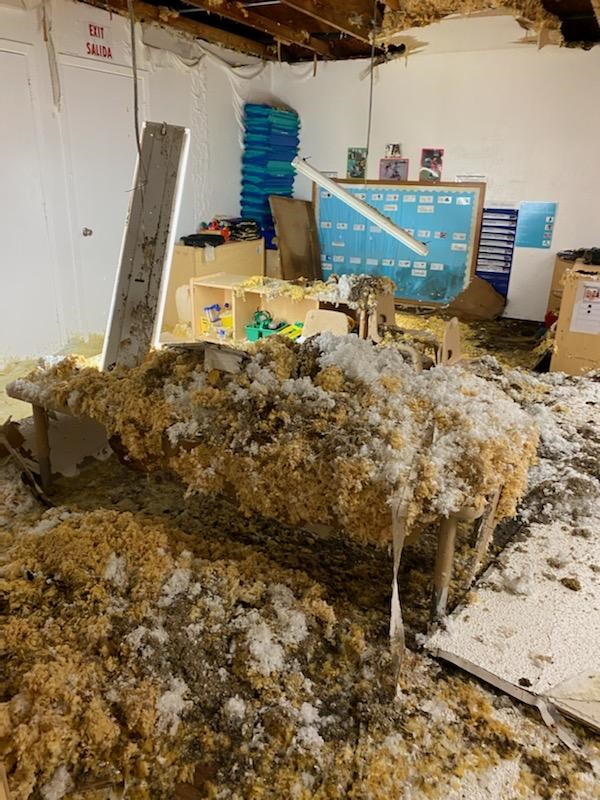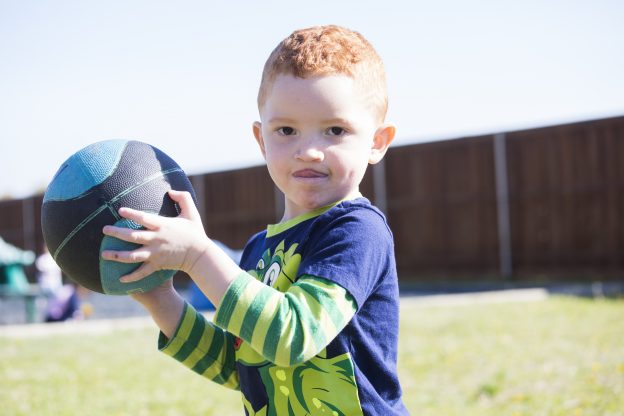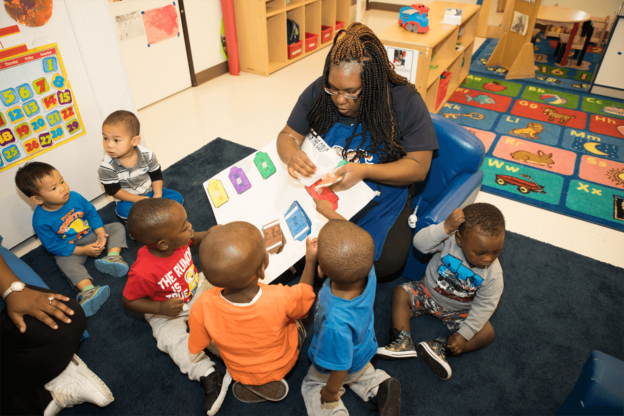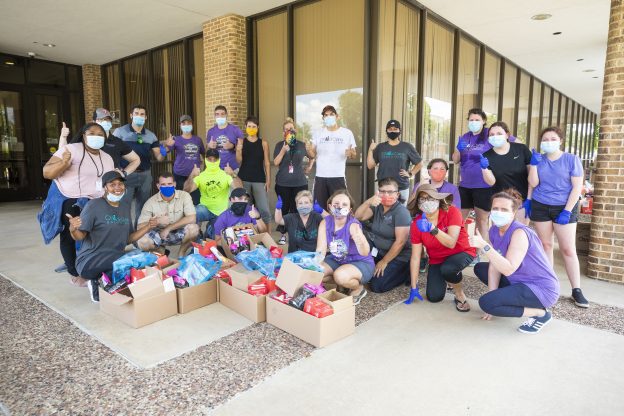
Child Care Associates commissions 2021 post-winter storm assessment
By Paul Harral
March 16, 2021
Child care businesses and facilities across Tarrant County have been critically impacted by the most recent winter storm, including some of Child Care Associates’ local operations.
As a convener and supporter of child care businesses in the county, Child Care Associates (CCA) released a countywide survey to all licensed child care programs with 730 Texas child care businesses responding to the survey.
To support those child care programs adversely impacted by the storm, CCA has also created a Recovery & Resiliency Fund, the organization said in a news release.
“What a devastating time for child care programs on top of the business challenges already being faced as a result of COVID-19,” said CCA CEO Kara Waddell. “Child care businesses are not as well-equipped as schools to recover from such destruction including understanding insurances, finding alternative sites and a host of other critical issues. Our goal with the CCA Recovery & Resiliency Fund is to support and guide impacted child care businesses challenges after COVID as well as the winter storm. Our working families and economy depend on child care to be back up and running as soon as possible.”
Child Care Associates Recovery & Resiliency Fund includes such supports as:
- Assisting child care businesses in assessing facility and property damage
- Offsetting deductibles for businesses with insurance
- Replacing damaged classroom materials and furniture
- Educating business owners on how to tap into FEMA and SBA support programs
- Setting up temporary classrooms with educational supplies, materials and furnishings
- Coaching child care businesses one-on-one towards resiliency in the COVID-19 era
Winter Storm Damage Assessment
The post-storm survey had 730 Tarrant County child care businesses respond. Of that, 105 local businesses indicated facility damage at an 8, 9 or 10 level with 10 being devastating; 46 (6 percent) indicated the storm’s impact requires a relocation to a new building so repairs could be made to their facilities over the next three-to-six months or longer.
Key Assessment Take-Aways (Total responses – 730 (of 1,100+):
Has your operation been affected by Winter Storm Uri?
Yes – 329 providers (45%)
No – 343 providers (47%)
Is damage great enough to consider relocation?
Yes – 46 providers (6%)
No – 486 providers (67%)
Not yet determined/Unsure – 198 providers (27%)
On a scale of 1-10, how would you rate the impact of the storm on your business?
105 programs indicated an 8, 9 or 10 damage level, with 10 being devastation
8-9 Rating – 65 providers (9%)
10 Rating (total devastation) – 37 (5%)
Do you have property Insurance that will help offset the damage?
Yes – 50%
No – 50%
Do you have Business Interruption insurance?
Yes – 10%
No – 90%
https://childcareassociates.org.
Child Care Associates commissions 2021 post-winter storm assessment | Fort Worth Business Press

Will Child Care Businesses Survive 2021?

Child Care Associates names the 2020 North Texas Early Childhood Leadership Award recipients
Local social entrepreneur, family child care provider and national speaker Jerletha McDonald, and the public-private partnership The Best Place for Kids! have received the Child Care Associates (CCA) North Texas Early Childhood Leadership Awards in the categories of individual and organization, respectively.
This is the third year CCA has presented awards to local honorees.
“At Child Care Associates, we are devoted to ensuring every child has access to the quality early education needed to succeed in education and life. While there is much work to be done, CCA celebrates leaders who work creatively to advance outcomes for young children. We established this award in recent years to honor these early childhood heroes,” CCA CEO Kara Waddell said in the announcement.
McDonald is honored for her leadership in the family child care space. Home-based or family child care is an important option for families seeking affordable, accessible care that meets their family needs.
McDonald is the founder and CEO of the Arlington DFW Child Care Association, a family child network, working to improve the quality of child care among home-based providers. She is also the owner/director of Nurturing Gifts Infant and Toddler Center, JayMac Enterprise – a consulting agency for family childcare professionals, and the host of the highly acclaimed Radio/Visual Podcast Show, The Jerletha McDonald Show: Everything Child Care! In 2019, she was appointed to Gov. Greg Abbott’s Early Learning Council.
“I will continue to use my voice and influence to empower programs and collaborations for early childhood educators. We want to unapologetically strive for excellence in leadership while also working to excel in business development and economic mobility,” McDonald said in a news release. “The early care and education workforce is a significant segment of the United States workforce and economy. Families and businesses rely on us to care for and educate young children.”
Best Place for Kids! is a local public-private partnership focused on ensuring that 1.) every child has access to a quality education starting at birth, 2.) families are connected with critical community resources, and 3.) businesses are supported with research-backed strategies that benefit working parents and businesses’ bottom line.
In the last year, Best Place for Kids! launched the FIND! Child Care Tool, allowing families to search in real-time for nearby quality, available child care seats for their children age 0 to 12 in Tarrant County. Best Place for Kids! has also developed a business tool allowing businesses large and small to self-assess their workplace as a “Best Place for Working Parents.”
“We are honored to receive this award because Best Place for Kids! has been such a collaborative effort. We are proud and humbled to have business leaders, city officials, nonprofits, philanthropy, and educators all working together to develop innovative solutions that make Tarrant County an ideal place to live and work,” said Cheraya Peña, director of The Best Place for Kids!.
Child Care Associates is one of the largest child development nonprofits in North Texas and has served more than half a million young children in the past 53 years.

Commentary: The Road to Recovery: Strengthening Our Community Post COVID-19
Rose Bradshaw
Anthropologist Margaret Mead was asked, “What was the first sign that civilization exists: the invention of fire or the discovery of the wheel?”
Mead replied, “Neither. The first sign of civilization was the discovery of an ancient femur that had been broken and healed.
“The healed femur tells me that someone found that wounded person, took the time to stay with them, and bind the wound. A healed femur indicates that someone helped a fellow human, rather than abandoning them to save their own life.
“Helping someone else through difficulty. … That is where civilization starts.”
By Mead’s definition, the level of charitable activity in our community over the past six months indicates that we are, indeed, a civilized bunch.
When the pandemic brought our nonprofit sector to its knees financially, North Texas Community Foundation fundholders, private foundations and individual donors pumped more than $20 million into organizations working on the front lines.
The impetus to “do good” helped stabilize our community.
But doing good is not enough to get us on the road to recovery. For our community to thrive again, we need to do good, well.
Doing it well – that’s surprisingly hard. So what do we need to get the job done? Adequate resources and strong, solution-driven partners are important in the best of times. In a crisis, they are essential.
Here’s a quick run-down on where we stand today:
Resources: Charitable Giving & Federal Stimulus Helped Meet Immediate Need; Uncertain Funding Dims Prospects for Long-Term Recovery
Charitable donations have accomplished a great deal to date. That $20-plus million in local funding fueled a phenomenal response from leading agencies such as Tarrant Area Food Bank, Meals On Wheels, Catholic Charities, United Way, Child Care Associates, Boys & Girls Club, Camp Fire, Center for Transforming Lives, Safe Haven, Alliance for Children, ACH Child & Family Services and so many more.
Outstanding leaders at each of these organizations went into overdrive to diagnose problems, develop solutions and marshal the resources to deliver critical, life-saving services.
The good news?
Essential services continued, unabated. Using the broken femur analogy, we bandaged the wound, applied the cast and administered the painkillers (which I hope were brewed locally!).
The bad news?
The patient is in critical condition.
When COVID hit, our nonprofits doubled-down on the delivery of services and cancelled the revenue-generating events on which they depend for nearly 50% of their income.
Now, many are struggling to survive – during a time when their clients are more fragile than ever.
So, where do we go from here? How do we ensure that we rebound and fully recover?
First and foremost, we can’t let high-performing organizations go out of business due to short-term cash flow issues.
If we do, we will live to regret it. Who wants to start from square one next year to recreate the teams and strategies that are so effective today?
Nonprofits play a critical role in our economy – creating jobs, leveraging public dollars, and delivering vital services. According to economist Ray Perryman, Fort Worth/Arlington nonprofits employ 130,000 individuals and generate $10.3 billion in GDP. In addition to all the good work they accomplish, that revenue pays salaries and buys goods and services.
While not on the front lines, visual and performing arts organizations are vital to our well-being and need our help as well. Over the past six months, they stepped to the sidelines so that we could devote charitable resources to meet emergency needs. Going forward, artists will be essential to helping us process, understand and heal from this experience and all those that follow.
The same holds true for animal welfare organizations. They have risen to the challenge to meet the needs of all those animals whose human companions have hit hard times.
Bottom line: Flexible, general operating support is the lifeline for the organizations on which we depend. If we want them here next year, they need our support today.
As we emerge from this pandemic, nonprofits that struggle financially will need to make tough decisions.
They will need to take a hard look at what they are doing today and reimagine how to meet the needs of our new environment.
As John MacIntosh of SeaChange Capital Partners observed: “Nonprofits may need to explore mergers, consolidations and the divestment of ‘non-core’ programs. … If restructuring allows for survival and the continuation of the mission, it is far better than hitting the wall and closing up shop altogether.”
PUBLIC/PRIVATE PARTNERS ARE DRIVING SOLUTIONS
Our local nonprofits are partnering with other agencies, city and county government and local foundations to develop solutions that scale. Here’s a re-cap of some incredible work underway to meet immediate needs:
Child Care for Frontline Workers: Child Care Associates, Camp Fire and Best Place for Kids collaborated with The Miles Foundation, Rainwater Charitable Foundation and others to create FIND!, an online platform that allows remote users to identify available slots at local child care agencies. CCA also launched financial support services to offset care costs for essential workers. The Tarrant County model is now going statewide.
School Age Collaborative: Working parents are struggling to balance their children’s health and safety with job responsibilities while dealing with virtual learning, lay-offs, and limited financial resources. Girls Inc., Boys & Girls Club, YMCA and Clayton Yes have joined forces to provide supervision and assistance to students while they complete virtual learning hours and provide enrichment activities.
Digital Connectivity: Read Fort Worth and Best Place for Kids are working closely with the FWISD to provide devices and tech support to meet families’ critical IT needs. The work is fueled by investments from AT&T, Facebook, Fort Worth Education Partnership, The Morris Foundation, North Texas Community Foundation’s Better Together Fund, Paul E. Andrews Foundation, PNG, Rees-Jones Foundation, and Sid W. Richardson Foundation.
Access to Food: The good news is we have enough food to go around. The challenge for those who are hungry is accessing it.
United Way of Tarrant County is working with local agencies to coordinate county-wide distribution sites. Tarrant-Area Food Bank is hosting five Mega Mobile Markets per week. For Meals on Wheels, demand has increased 30% since March. The organization is now serving 3,000 meals daily. Amon G. Carter Foundation, Better Together Fund, Sid W. Richardson Foundation and thousands of donors have provided critical support for this work.
Telemedicine: Dr. Stuart Flynn’s vision of patients across north Texas receiving vital healthcare via telemedicine has come to pass. Texas Health, Baylor, MHMR, and countless health providers have pivoted to use 21st century technology to conduct examinations, increasing the numbers served exponentially.
Housing for those who are Homeless: Tarrant County Homeless Coalition is directing $8 million in CARES Act funding, bolstered by thousands of donations from local residents, to prevent evictions, move homeless individuals and families into housing, and enhance cleaning at our emergency shelters. Critical partners include DRC Solutions, Presbyterian Night Shelter, and Union Gospel Mission.
FOUR WAYS TO FUEL LONG-TERM RECOVERY
While we work to stabilize essential organizations, we need to remember that a bigger, more expensive reconstructive period awaits us.
If we stick with “business as usual,” the femur won’t mend, and the patient won’t make it.
COVID has revealed opportunities for long-overdue change. Here are key ways we can bring about enduring, systemic improvements for the community we love:
1.) Create Educational Pathways to Economic Prosperity:
With just 14% of Tarrant County’s economically disadvantaged students achieving a post high school degree or professional credential, the status quo is unacceptable and unsustainable.
Tarrant To & Through Partnership (T3) is a game-changing initiative spearheaded by the Rainwater Charitable Foundation, Hillwood, JPMorgan Chase, and North Texas Community Foundation fundholders to help students excel academically and become successful participants in our economy.
Students, local businesses, FWISD, Tarrant County College, and local universities have made a compact to transform the way we prepare students for productive careers. Their success depends on our support — in funding, mentoring, internships and good advice.
To learn more about how you can participate, contact Jay McCall: [email protected]
2.) Bridge the digital divide: COVID-19 has taught us that access to technology and digital skills are necessities. Going forward, all residents need digital connectivity to learn, grow and advance. The City of Fort Worth, FWISD, and Tarrant County officials are working with local foundations and investors to determine how to best integrate a community-wide digital infrastructure.
If you can help, contact Mattie Parker: [email protected]
3.) Support Comprehensive Economic Development: All the charity in the world will not create economic prosperity for our community. Fort Worth Chamber’s bold “Fortify” strategy — coupled with John Goff and Elaine Agather’s Fort Worth Now initiative -provides the framework for success. Corporate, city, county and philanthropic investments are critical to helping develop local industry, attract new business and cultivate public/private partnerships that drive our economy.
Brandom Gengelbach at the Chamber will help you get connected: [email protected]
4.) Invest to Achieve Racial Equity: None of the investments described above will be successful if they are not available and accessible to all North Texans.
The pandemic revealed what many area residents and local leaders already knew to be true. The Texas miracle – of full employment, affordable housing, and quality healthcare – has not been equally shared across our community.
We have our work cut out for us.
Individuals and organizations such as Leadership ISD, Community Frontline, Diamond Hill Northside Youth Association, LVT Rise, Broadway Baptist Church, Early Learning Alliance, Fort Worth Chamber and Rotary are on the case – taking on the difficult and necessary work of helping us understand our past and charting the path forward to an equitable future.
They can’t do it alone.
Get connected to the good work underway, and we’ll all be the better for it. Reach out to
Donna James-Harvey, NTxCF’s liaison for the Fund to Advance Racial Equity: [email protected]
Together, we can build a community strengthened by the full participation and contributions of all North Texans.
FUTURE PROGNOSIS?
When it’s all said and done, will the broken femur mend, the patient heal?
Will we come through this pandemic stronger than we were before?
That all depends on what we do next.
North Texas Community Foundation stands here to assist. We are honored to work alongside you, and our 246 fundholder families, to make sure our community is strong – for this generation and all those to come.
The future is counting on us.
About North Texas Community Foundation
North Texas Community Foundation is dedicated to strengthening our region through effective philanthropy and civic leadership around key community issues. We serve local individuals, families and corporations by helping them achieve their charitable goals in a meaningful way – during and beyond their lifetimes. The Community Foundation is privileged to work in collaboration with our fundholders, their trusted professional advisors, nonprofit partners and civic leaders to make sure North Texas is strong for generations to come. The Community Foundation made grants totaling approximately $27 million in 2019. For more information, visit www.northtexascf.org.

Child Care Associates re-opens 20 early education campuses
Child Care Associates (CCA) reopened all 20 of its early education centers Oct. 5, offering low-income families quality early learning options with the choice of in-person or remote services, the organization said in a news release.
CCA serves more than 1,800 children in Fort Worth, Arlington and the greater Tarrant County area.
“CCA and our team of early education professionals are thrilled to offer in-person Head Start and Early Head Start services again to children and their families,” said CCA President and CEO Kara Waddell.
“We’re big fans of in-person learning for our youngest children because they learn by rich hands-on experiences. Play-based learning allows children the opportunity to develop speech and language skills and to hone their listening skills as well,” she said.
CCA campuses are finalizing the additional health and safety features including portable hospital grade air filtration systems or HVAC UV light air cleaning systems, contactless health screening checkpoints at entry, and other enhanced protocols to minimize COVID-19 exposure, the organization said in a news release/ “We’ll start off the year with smaller classroom sizes – no more than eight for infants and toddlers and 10-12 for our preschoolers – and two teachers per classroom,” said Travis Davis, CCA’s chief of early education. “CCA teachers and staff are following CDC and Tarrant County Health guidelines to better support the health and wellbeing during this COVID-19 period.”
For families not quite ready for in-person learning, CCA offers income-qualifying families’ direct access to remote teaching teams to support developmentally appropriate, home-based learning and promote family engagement.
All of CCA families, including those who opt for remote instruction, will continue to receive the full services of CCA’s whole-child whole-family approach including weekday meals of breakfast, lunch and snacks for their children, the news release said.
Families who select remote instruction may receive a mobile-powered tablet with access to home-based activities and content to shape their child’s development and support their ongoing learning.
Visit https://childcareassociates.org/head-start- early-head-start for eligibility and enrollment information More information: https://childcareassociates.org – FWBP Staff

Media Release: CCA to Nationally Accredit Its 20 Early Education Campuses
July 6, 2020
For Immediate Release
Child Care Associates Aims to Nationally Accredit Its 20 Early Education Campuses that Serve 2,000+ Underprivileged Children in Tarrant County The Agency is Leading Tarrant County Child Care Outreach Efforts During COVID-19 and is the largest provider of Head Start and Early Head Start Programming in the County
FORT WORTH, TX – The lead agency advising Tarrant County officials on child care for essential workers and child care provider support during COVID-19, Child Care Associates (CCA), today announced its commitment to achieving national accreditation through the National Association for the Education of Young Children (NAEYC) for its early education campuses within three years. In Texas, of the 14,796 licensed child care settings, only 317, or less than two percent, have achieved NAEYC national accreditation standards. NAEYC is the nation’s largest and most-widely respected accreditation in early childhood quality practices.
“NAEYC Accreditation has been a benchmark of high-quality early childhood experiences for more than 30-years in Texas and we are so excited to have Child Care Associates commit to this level of quality. Now more than ever, young children need to be not only in a safe and healthy environment, but surrounded by environments enriched with learning experiences that will help them grow and develop to their fullest potential with educated teachers leading the way,” said Texas Association for the Education of Young Children (TXAEYC) Executive Director Kim Kofron, M.Ed. “When families have their children in a NAEYC accredited program they know they are getting the highest quality care for their children. TXAEYC applauds CCA for this level of commitment to our youngest Texans.”
According to leaders in the child care industry, COVID-19 has raised the profile of need for ensuring early education settings are high-quality with appropriate square footage, highly qualified staff and health/safety standards at the highest levels. While there are other organizations that offer accreditation for programs serving young children in the field of early childhood education, NAEYC remains the gold standard for programs serving children birth to 5-years of age.
“At CCA, we put children first…always. COVID-19 has helped us realize our need to be steadfast on our longstanding commitment to quality education for young children,” said CCA CEO Kara Waddell. “While we have always worked to attain standards higher than what child care licensing requires (including Head Start and Texas Rising Star standards), we are formalizing our commitment to the families we serve with this national accreditation. Families of all income levels value and expect more than ever before including a commitment to safety, health practices and the highest standards of child-centered learning.”
CCA’s history of providing quality early childhood education has proven that the experiences of young children influence brain development and adult attachment, as well as prepare children for lifelong learning. Areas of additional commitment from CCA include:
- Early Ed Essentials – a validated tool that assesses the campus conditions including a culture of family engagement and collaborative teaching.
- University assessors – who externally assess the quality of teacher-child interactions in CCA classrooms twice annually using a gold standard CLASS observation tool.
As the lead agency advising Tarrant County officials on child care for essential workers during COVID-19, early on CCA collaborated with its data and technology partners to create FIND!, an online platform that allows remote users to update child care status at local child care agencies. CCA also launched financial support services for essential workers that allows essential workers to apply to offset 100 percent of child care costs via CCA’s Child Care Management Services (CCMS) program. Waddell serves on Governor Abbott’s Texas Frontline Child Care Task Force and leads a subgroup of the National Emergency Child Care Task Force with Save the Children.
About Child Care Associates
Child Care Associates is one of the largest child development nonprofits in North Texas and has served more than 620,000 young children in the past 52 years. Through Head Start and Early Head Start programs, Child Care Associates delivers early education that ensures children who need it most are ready to succeed in school. Child Care Associates operates 20+ child development centers in the greater Fort Worth and Arlington-area to serve 2000+ disadvantaged children per year. Partnering with school districts and charter schools, Child Care Associates ensures underprivileged children in Pre-K also benefit from whole child, whole family services.
Child Care Management Services (CCMS) is CCA’s largest program, annually providing services to more than 12,000 children by assisting working parents with the cost of child care and improving the quality of child care programs and professionals.
At a time when Fort Worth and Arlington are rallying around the needs of early education in unprecedented ways, Child Care Associates is dedicated to supporting the growth and development of young children zero-five years old. CCA supports the belief that all children benefit from access to quality early education. For children from lower-income families, CCA’s signature early education services help “boost” children to success. CCA combines high-quality early education for young children with supports that promote nurturing parenting to help ensure children reach their full developmental potential by the end of third grade.
For enrolling your child in a CCA campus, please visit: https://childcareassociates.org/head-start-early-head-start/. For enrolling to receive CCMS child care subsidy assistance, please visit: https://tarrantcountyccms.org/home/parents/.
For more information about CCA: https://childcareassociates.org.
PR Contact: Susan K. Medina
SKM Communication Strategies, LLC
817-707-1306

Commentary: The trifecta challenge of families during COVID-19
By Kara Waddell
Only a few hours after putting my mother on a plane to fly home early from our family visit, Tarrant County Judge Glen Whitley rang in on my mobile.
“Better get down here, Kara, we’re making decisions now and we’re going to need child care in all this.”
Emergency declarations and stay-at-home orders related to COVID-19 followed later that day. Having previously worked in disaster relief in Asia, I felt a familiar pit in my stomach that hits when on the edge of an emerging disaster.
With some space and time between the initial emergence of COVID-19 and our current state, it seems our experience the coronavirus pandemic is proving to be somewhat mercurial.
It is a disease that impacts the elderly, yet, in recent weeks cities have been reporting 30-40% of cases are involving 20- to 40-year-olds. It is said to be transmitted by non-symptomatic persons but then some studies indicate otherwise. Masks weren’t needed – now masks are a staple in the workplace and hanging from folks’ rear-view mirrors.
Yet some certainties are emerging from COVID-19. As an education leader, it is these certainties that worry me the most. At Child Care Associates (CCA), we focus our efforts on children from the lowest-income families. And watching these families is what has me concerned.
First, COVID-19 is currently being contracted more by persons of low-income and who are black and brown. The CDC points out that health differences that vary by race or ethnicity often point to underlying economic and social conditions. Some might more directly point to structural and justice conditions in our society.
Regardless of where you identify the cause, COVID-19 is flat out impacting families in our community differently. CCA’s team includes an African-American staff member who lost three members of her family to COVID-19 in a span of two weeks. She commented that she can’t process the grief because more keeps coming. COVID-19 has been tough on my family but doesn’t come close to her experience.
Additionally, low-income families are heavily overrepresented in unemployment numbers. Two-thirds of CCA’s Head Start families have indicated on a recent survey that their household has experienced a change in work status.
For my family, a change in work status meant working from home. For the families we serve, a change in work status means a loss of job and/or a significant loss of hours. Families are struggling to make ends meet as Fort Worth and Arlington see long queues of vehicles for a box of food or a meal. And families of color are also disproportionately impacted by COVID’s resulting economic challenges.
Yet it is this last concern that, as someone working in early education, has me particularly distressed: Education leaders nationally are predicting an explosion of achievement gaps we’ve not seen before. Nationwide.
Richard Rothstein, a distinguished fellow of the Economic Policy Institute, writes frequently on achievement gaps. He asserts that the COVID-19 pandemic will exacerbate existing achievement gaps between middle and low-income children. The gaps that already exist will widen – again, black and brown children – will figure prominently in these statistics.
These trifecta adversities facing minority and lower-income families is what has me penning this op-ed.
For many children, an early learning center or a school is their safest place. Child abuse reports have dropped in our community while the instances of abuse that are reported are particularly severe. Why? Because the “tellers,” our teachers, doctors, religious leaders and child care workers who are mandatory reporters aren’t seeing the children.
And while all children are impacted, the impact may even be greater among our youngest children. Toxic stress in the home from economic insecurities and other factors alter how young brains develop hindering their emotional health and learning. Richard Rothstein points out in the Washington Post, “If a research consensus exists on anything in education, it is that the socioeconomic gap in cognitive performance is well-established by age 3.”
The case for quality early education among disadvantaged children has been made for decades.
If we ever needed quality early learning and care, certainly it is now. This is not a time to shy away from our Texas investment in full-day Pre-K for preschoolers made last legislative session. It is a time to shore up our investments in quality child care for infants and toddlers.
In Austin and locally, we need to continue to aim our CARES funding in meaningful ways to sustain quality child care programs. The real cost of quality child care cannot be borne by low- or middle-income families and cannot be sustained on the vapors of child care vouchers.
For those running businesses, COVID is helping executives rethink the kinds of supports and flexibilities parenting employees will need if returning to work.
While there is no silver bullet for academic achievement gaps, now is the time to double down on investments in quality early learning, including Pre-K, child care, home visiting and (Early) Head Start.
Link to story: https://fortworthbusiness.com/education/commentary-the-trifecta-challenge-of-families-during-covid-19/

Kara Waddell named among 400 Most Influential People in Fort Worth
Child Care Associates proudly congratulates CEO, Kara Waddell on being named one of the 400 most influential people in Fort Worth.
Launched in July 2018, “The 400” identifies the most influential individuals in Tarrant County across a range of sectors, including arts, business, education, economic development, government, professional services, nonprofits, and philanthropy, as determined by the editorial staff at Fort Worth Inc. The editorial staff at Fort Worth Inc. considers potential members of this list as people in Tarrant County who wield significant influence in industry, philanthropy, nonprofits, government and public policy, economic development, professional services, education, civic affairs, arts, religion, sports, and media, or within their own spheres.
-Child Care Associates
August 2020
817-838-0055

Child Care Associates Leading Tarrant County Child Care Outreach Efforts
Child Care Associates (CCA) has been tapped to lead Tarrant County’s efforts to ensure childcare for children of essential workers, as well as to support childcare providers during the COVID-19 response period. Just before the emergency declaration was made by Tarrant County, CCA’s CEO Kara Waddell was asked to help coordinate a response.
A fundamental building block in disaster response is to understand the supply.
“In working to determine the supply of available childcare, CCA turned to our data and technology partners to build an online platform that allowed remote users to update childcare status,” Waddell said in a statement. “Critical information such as if a childcare program is open and how many slots are available for children by age, is now available through this platform.”
Within days, former classroom coaches now turned “caseworkers” had called every licensed facility in Tarrant County. In partnership with The Best Place for Kids!™, CampFire and Educational First Steps, CCA helped to stand up the new, free childcare search function FIND! (https://find.bestplace4kids.com/families) to help essential workers see where the quality, available child care slots are for children zero-12 years of age across Tarrant County.
“Our community is now able to support working parents, specifically essential service workers during this emergency, with easy-to-use search tools. FIND! grants working parents the real-time information they need to make the incredibly personal decision of finding quality care for their children,” said Cheraya Pena, program director, The Best Place for Kids!™.
Post-COVID, this platform will serve every family who needs childcare by allowing a quick search for available quality childcare including openings for immediate service. http://find.bestplace4kids.com
Financial Support for Child Care for Essential Workers
CCA also launched new financial support services for essential workers. Now essential workers can apply to offset 100 percent of childcare costs via CCA’s Child Care Management Services (CCMS) program. CCA-CCMS works with Workforce Solutions for Tarrant County to pay for the cost of childcare for more than 7,300 lower-income working families across the county. Using this same system, CCA has now launched an emergency three-month assistance program for essential service workers to cover 100 percent of childcare costs. (https://bestplace4kids.com/child-care-financial-assistance-for-covid-19-essential-workers)
CCA said is was well positioned to direct the county’s response because of its scale and close working connections with the hundreds of childcare programs across the county. Waddell also brings experience in disaster relief from 10 years of international relief and development efforts in China.
“What’s important in disaster relief is to remember that disaster response requires local action. CCA already had close ties to our county and city leaders as well as close connections with childcare programs. We were just really well-positioned to respond when our leaders called upon us,” said Waddell.
Child Care is Critical
In addition to launching the new FIND! search tool and the financial assistance weblink, CCA has been helping the 412 childcare programs open for childcare during this response period. CCA and community volunteers delivered health and safety supplies to the front doorstep of childcare programs.
“I’m not sure everyone considered childcare ‘essential’ until COVID really hit. Our county’s childcare programs really are frontline workers, too, helping to ensure children are healthy and safe and essential workers can serve our community,” Waddell said.
With COVID-19, CCA changed how early education is delivered but is still serving children and families daily. CCA provides early education and care services to 2,300 infants, toddlers and preschoolers from disadvantaged families daily.
CCA Family Service Advocates have been reaching out to families to connect them to meal services, food pick up points and even doing door-to-door delivery of critically need infant formula and diapers. CCA teachers are in live remote contact with young children through an app that connects children to home learning.
“At CCA, we’re supporting our youngest Texans in our communities to feel connected during what can be a frightening time for young children,” added Dr. Travis Davis, CCA’s Chief of Early Education. “CCA is also working with the Tarrant Area Food Bank and other partners to ensure families with young children are accessing formula, diapers and others supplies needed by young children.”
CCA’s Waddell was also asked to serve on Gov. Greg Abbott’s Texas Frontline Child Care Task Force to guide statewide efforts. The Tarrant County FIND! platform proved the concept and served as a model for the statewide platform just launched to help guide essential workers across Texas to the 86,000 available childcare slots in the state. Waddell was also asked to join a National Emergency Child Care Working Group convened by Save the Children along with select federal and nonprofit leaders.
– FWBP Staff


